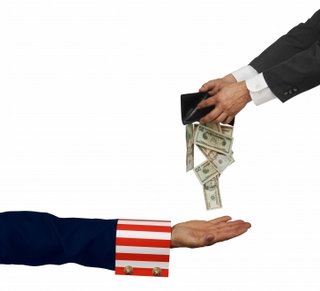Archive for 2009
Wednesday, February 11th, 2009

What began as a housing crisis has morphed into a full-scale credit crisis – affecting every segment of society. And with about 3 million people losing their jobs over the past 13 months or so, credit card companies are realizing that they need to add “flexibility” to their list of services.
Thus, many credit card companies are offering some type of “forbearance” to cash-strapped card holders.
What is “forbearance?”
It isn’t forgiveness – it is a temporary reprieve from your obligations, and it comes in different shapes. One is a postponement of six months, a year, or even longer. During this time your interest will continue to acrue, but perhaps not at the steep rate that you might be looking at when you open your credit card statement today.
Another form of forbearance offers a lower minimum payment, a reduced interest rate, and/or elimination of late fees.
What the credit card companies will offer depends upon your individual situation.
While card issuers such as Chase, Bank of America, Citi, and Discover are proactively reaching out to consumers when they first begin to fall behind, credit counselors advise consumers to contact their card issuers before the problem becomes that advanced.
Many are willing to work with card holders to arrange solutions that will allow card holders to maintain their good credit standing while assuring the card issuer of eventual repayment.
During the last quarter of 2008, Citi reports accepting about 350,000 accounts into its forbearance plan, while Bank of America modified nearly 850,000 credit card loans in 2008.
While these programs are socially responsible behavior on the part of card issuers, they are done in self-interest.
Credit card loans are unsecured, so if aggressive collection action on the part of card issuers forces a consumer into bankruptcy, the card issuer is the ultimate loser. They won’t get paid at all. The debt will become a chargeoff.
According to reports, credit card chargeoffs, which stood at 5.5% during the final quarter of 2007, reached 8% during the 4th quarter of 2009 and are expected to rise to almost 9% by late 2009.
9% doesn’t sound like a lot until you consider that right now, about $4.8 trillion in credit lines are open in the U.S.
No wonder credit card issuers are reaching out to card holders – trying to keep them on track with payments, even if those payments are strung out over a longer period of time.
Posted in credit cards | Comments Off
Wednesday, February 11th, 2009
 9.9 million Americans were the victim of identity theft last year. According to Javelin Strategy and Research, that’s a 22% increase from the year before. 9.9 million Americans were the victim of identity theft last year. According to Javelin Strategy and Research, that’s a 22% increase from the year before.
The good news is the average amount lost due to identity theft decreased even while the number of incidents increased. This is due to better detection and resolution both by businesses and consumers.
As consumers become aware of the need to check their credit reports regularly, and to enroll in programs that send alerts every time there’s activity that affects those credit reports, fraudulent activity is being halted faster.
Those who don’t become aware of identity theft for 6 months or more after the fraudulent activity begins end up paying far more than those who nip theft in the bud.
While many fear using internet shopping sites because of the threat of theft, it turns out that only about 11% of victims had been victimized by on-line thieves. Lost or stolen wallets, credit and debit cards, and checkbooks were the source of 43% of the incidents.
No figures were given to indicate the number of people affected due to lost data on the part of major institutions. The Veterans Administration and at least two major banking institutions have had security breaches in the past few years, with thieves gaining access to data on millions of individuals.
A growing threat to consumers is the practice of phishing. This does happen on line – with emails directing you to visit a site and verify account information. But it also happens via the telephone.
A current scam has consumers receiving phone calls informing them that they have missed jury duty – and giving them a way to get off the hook. The caller asks for personal information such as birthdate and social security number. If they already have your credit card or bank account information, this extra data ensures that they’ll have clear sailing in using your identity.
To protect yourself from identity theft, first keep your wallet, purse, and checkbook secure. Don’t leave these items in the car or let them out of your sight when in stores, restaurants, health clubs, etc. When you pay by credit card, don’t hand it to a server to process and bring back – wait to pay until you can keep your eye on the card.
Second, don’t give out any personal information over the telephone unless you called them. If your caller is legitimate, you’ll be able to look up the business telephone and return the call. Don’t call a number given to you over the phone, because it could also be phony.
If you get an “urgent” email telling you to visit a site and update information, don’t click the link. Go to what you know to be the true website and check to see if you do have missing or outdated information.
Check your credit card agreement to ensure that you have zero liability in the event your card number is used by an unauthorized person. If not, consider getting a different credit card.
And be sure to check your credit report regularly. Then sign up for alerts that will give you instant notification of suspicious activity on your credit report.
CreditScoreQuick.com your resource for free credit reports, credit cards, loans, and free credit repair advice.
Posted in Uncategorized | Comments Off
Tuesday, February 10th, 2009

Is the $7,500 first time homebuyer credit a good deal?
You decide. When you buy you first home between April 9, 2008 and July 1, 2009, you’ll be entitled to a $7,500 tax credit on your 1040 Federal income tax form. That could help you save tax dollars this year – or next year if you’re buying in the first half of ’09.
Whether it’s a good deal will depend upon your income now and your income as it will stand over the next few years. Because, you see, the credit has to be repaid. You’ll have 15 years to do it, adding $500 to your tax bill each year.
As it stands, the credit is nothing more than an interest-free loan of 10% of your home’s purchase price, up to a maximum of $7,500. Single taxpayers with incomes up to $75,000 and couples with incomes up to $150,000 are eligible. When your income rises above $95,000 ($190,000 jointly) you’re no longer eligible. Those who fall between the two limits will get a reduced credit.
The advisability of taking this credit will depend upon what you’re going to do with that $7,500. Using it to improve the house, spending it on an education that will result in a higher-paying job, or investing in tools, equipment, and supplies for your small business might make taking the loan a smart move.
If, however, you’ll do what the government hopes you’ll do to “stimulate the economy,” it’s not very smart. Paying for a new flat screen TV and stereo system over the next 15 years really isn’t a sound investment. Neither is making a down payment on a new car, unless your old car is really on its last legs.
If you were to use it to create another job, that could stimulate the economy and be a smart move, if the job benefited your business. But, you can’t hire someone for long with $7,500 – especially not after you deduct payroll taxes.
Don’t make any decisions based on this quite yet, because this program is still open to change. Congress is debating twists and turns that could alter it dramatically.
For instance, they’re considering doubling this credit to $15,000. Also, the new stimulus package includes a one-time credit for new buyers that won’t have to be paid back as long as they keep their homes for at least 3 years.
In response to current home owners who have cried “no fair!” Congress is also considering making the credit available to all homebuyers – not just first-time buyers.
Other proposals include promotion of a 30-year 4% fixed-rate loan for both new buyers and current owners who wish to refinance – with the government picking up the tab for the difference between 4% and the loan rate offered by the lender.
While all these programs are designed to stimulate buying, they’re causing some confused would-be buyers to wait.
Should they pay the rates offered now, or will they be able to get in at 4% next month? Should they go for the $7,500 tax credit now, or will there soon be a tax credit that doesn’t have to be repaid – and if they buy before that’s passed, will they miss out?
Posted in Uncategorized | Comments Off
Sunday, February 8th, 2009
 Early last year we learned that the IRS had decided not to impose income tax on homeowners who sold their houses via a short sale. Early last year we learned that the IRS had decided not to impose income tax on homeowners who sold their houses via a short sale.
This is a sale in which the buyer pays less than the current balance due on the house and the mortgage company “forgives” the remaining balance. In order to qualify for a short sale, homeowners must show proof that their home did not or would not sell for an amount equal to or greater than the balance due on the mortgage. Additionally, they must submit proof that they do not have enough assets to make up the shortfall.
Until recently, homeowners were required to pay income tax on the forgiven balance because the IRS treated it as income. That policy was reversed under the Mortgage Debt Relief Forgiveness Act of 2007, and applies to the sale of qualified principal residences after 2006 and before 2010.
The decision was, assumedly, in response to falling home values across the country. While short sales used to be a once-in-a-while occurrence in any given market, they are now very common. In fact some Realtors are specializing in handling nothing but short sales.
Removal of the tax imposition lifted a huge burden for homeowners who were already in financial trouble.
Now we’re warned that consumers who were unable to pay their other debts in 2008 may face income tax on the amounts that were forgiven or cancelled. The tax liability may also extend to the forgiven interest and penalties as well as the forgiven principal.
As was formerly the case with forgiven mortgage debt, the IRS treats these amounts as income.
If the amount exceeds $600, the creditor is required to report the amount to the IRS and the taxpayer on a form 1099-C. This does not apply to debts wiped out in bankruptcy.
The loophole in this tax law is insolvency. If you receive a 1099-C, contact a tax professional or the IRS for instructions on how to demonstrate that insolvency. This may remove your obligation to pay tax on the forgiven balances.
If you are currently negotiating to settle a debt, or if you may do so in 2009, get tax advice before you settle. Then you can be prepared with the proper paperwork to show insolvency and avoid this tax.
Posted in Uncategorized | 2 Comments »
Sunday, February 8th, 2009
 Unless an agreement is reached between Fair Isaac and Experian before February 14, you as a consumer will no longer be able to access your Experian FICO credit score. Unless an agreement is reached between Fair Isaac and Experian before February 14, you as a consumer will no longer be able to access your Experian FICO credit score.
On January 15, Experian notified Fair Isaac of the intention to end their 6-year partnership with myFICO.com. They will continue to sell FICO scores to lenders and other businesses, but consumers will not be able to access the Experian score through myFICO.com or any other source.
Experian credit reports will still be available to consumers, but without the FICO scores.
Equifax and TransUnion will continue to make FICO scores available to consumers through myFICO.com and various on line websites, including (http://www.creditscorequick.com/ and http://www.freecreditscorequick.com/).
Given the animosity generated by an October 2006 lawsuit filed by Fair Isaac against the three credit reporting bureaus, this move is not entirely unexpected. In that lawsuit, Fair Isaac alleged that Equifax Inc., Experian Information Solutions Inc., TransUnion LLC and VantageScore Solutions, LLC had violated anti-trust laws and engaged in unfair competitive practices when they launched the VantageScore credit scoring model in March 2006.
In mid-2008 Fair Isaac Corp. agreed to dismiss Equifax Inc. as a defendant in that lawsuit, stating that Equifax Inc. had stopped the unfair practices and that the two companies were working together to release the new FICO 08 model for Equifax customers.
The new model is similar to the current model, but with enough significant differences that consumers will not be comparing “apples to apples” when looking at their FICO scores from both Equifax and TransUnion.
The outlook for consumers is not good. With America experiencing the worst economic climate since the Great Depression, consumers need more access to their credit information, not less. But unless Experian and Fair Isaac come to an agreement before February 14, consumers will be left in a state of confusion.
TransUnion will be offering FICO scores under the old model; Equifax will be providing scores using the new model; and Experian scores will be available only to lenders and other business entities.
This is the second time that Experian has threatened to terminate the partnership, so hopefully the two companies will once again be able to reach agreement and continue working together.
The problems may work out to everyone’s satisfaction. But meanwhile, the best course of action is to get your 3 free credit reports - with all 3 scores – today.
CreditScoreQuick.com your resource for free credit reports, credit cards, loans, and free credit repair advice.
Posted in Fair Issac, fico score | Comments Off
Friday, February 6th, 2009
 While most credit card issuers are cutting back on offers, a few are still mailing, hoping to find a few more reliable customers. And some of their offers sound too good to resist! While most credit card issuers are cutting back on offers, a few are still mailing, hoping to find a few more reliable customers. And some of their offers sound too good to resist!
You might be offered introductory rates at Zero percent for a limited time – no balance transfer fee – no annual fee for a rewards card – a low rate for the life of a transferred balance.
If you use your card a lot, or if you currently have a balance on a card with high interest, you may be tempted to take them up on the offer. But first read the fine print.
It may SAY you’re pre-approved in the large print, but the small print may say you’ll get the offer only if you meet their requirements. This could include your income, your debt to income ratios, and your credit scores.
Be careful here. If you tell the truth on the application and they don’t like your annual income, you may not only be turned down for this card, your revelation could trigger a reduction in credit lines with affiliate cards.
Chase Bank, for instance, offers a wide variety of cards – you may already have one or more. But if you fill out a new application and enter an income that’s “too low” they will share the information with other Chase cards and you could pay the consequences.
Next, after you’ve filled out the application and asked to have a balance transferred, don’t assume it’s a “done deal.” They could deny the transfer altogether, or transfer just a portion of the balance. And that could turn into a mess, because they might also give you a higher interest rate than the teaser letter promised. You might be going backwards!
What can you do? If they’ve done a transfer at an unattractive rate, call and negotiate. Try to get it back to at least the rate you were paying on the previous card.
If they denied the transfer, or if you hadn’t asked for one, simply call and cancel immediately. If you do it right away, it won’t reflect poorly on your credit score because neither the account nor the cancellation will have been reported.
A better plan is not to ask for the balance transfer until you have the new account. Getting a partial transfer, or getting a transfer at the wrong terms will only serve to complicate your life.
Instead of responding to an offer in the mail…
If you need or want a new card, do your research and apply for exactly the card you want. Find out what is available for a person with your credit score and your debt to income ratios. Then choose the card that’s most favorable to you and make application.
Don’t include a balance transfer in your application – you can do that later if you’ve gotten the rate and terms you wanted.
CreditScoreQuick.com your resource for free credit reports, credit cards, loans, and free credit repair advice.
Posted in credit card offers | Comments Off
Friday, February 6th, 2009

Credit card users were overjoyed and then deflated when, in December, Federal Regulators announced restrictions on deceptive and unfair practices used by the credit card industry.
While the new regulations addressed most of the worst practices used by card issuers, they weren’t set to go into effect until July 2010. That left plenty of time for card issuers to lower the boom on current credit card users.
When the regulations were passed, credit card companies asked for time to implement the new rules, and congress complied. Now, perhaps as a result of public outcry, a bill has been introduced to congress to speed up the process. If passed by both the Senate and the House, the bill will then go to the President. New regulations would take effect 90 days after receiving the President’s signature.
Among the measures covered by this legislation the bill will obligate credit providers to give customers 45 days’ notice for rate increases and would prohibit them from raising rates on current balances, unless the card holder payments are more than 30 days late.
It will also end the practice known as double-billing, which has been costly for consumers who carry a balance on their cards.
Card issuers will also be required to mail statements in a timely manner – so that card holders have time to receive the bill, pay it, and mail it back by the due date. Presently, the bill may be due the day after receipt – forcing card holders into a late-payment situation.
Representative Carole Maloney, who authored the bill, said “Congress should act immediately to stop them, not force consumers to wait another year and a half before they get relief.”
Meanwhile, credit card holders should watch their statements carefully – and open them the day they arrive. Check for due dates, interest rates, credit lines, and minimum payments. Don’t assume that things are the same as they were on the previous statement, because until this legislation becomes law, card issuers don’t have to give you fair warning.
In addition, be sure to read every correspondence from your card issuer, and if you plan to make a large purchase with your credit card, go to the website and check your available balance before leaving home. Just because you had $5,000 available on your most recent statement doesn’t mean it is still available.
CreditScoreQuick.com your resource for free credit reports, credit cards, loans, and free credit repair advice.
Posted in credit card regulation | Comments Off
Friday, February 6th, 2009
 While Washington is pinning its hopes for a revitalized economy on the spending habits of consumers, financial experts are advising a halt to discretionary spending, and Americans are heeding the advice. While Washington is pinning its hopes for a revitalized economy on the spending habits of consumers, financial experts are advising a halt to discretionary spending, and Americans are heeding the advice.
New reports show borrowing is down and savings are up – indicating the average American’s concern with being able to pay bills and maintain a good credit rating.
Many consumers are also taking advantage of free credit reports to keep a close watch on their FICO scores and to be immediately alerted to mistakes and signs of identity theft.
But there’s one decision conservative borrowers are making that could hurt even while it helps. That is the decision to move outstanding credit card balances from high interest cards to lower interest cards.
Consolidating balances in that way is smart in that it puts more dollars toward paying down debt and fewer dollars toward paying interest, but it could hurt FICO scores, and that could hurt in the long run.
Under the current FICO credit scoring system, your score will be better if your debt is spread out among all your available credit – so that you use no more than 30% of the credit available on any one card. In fact, some experts say you shouldn’t use more than 10%.
Even when your total debt remains the same, if it is concentrated in one card and that concentration brings your use of that card over 30%, your score will begin to fall. If you get up close to “maxing out” the card, your score will suffer even more – even if you have a zero balance on several other cards.
FICO is instituting a new scoring system this year, and this problem could be addressed, but we have read nothing to indicate that it will. So in the meantime, consider this move carefully, and take another step before you decide.
Before making any decision, contact your card issuers. Ask to have your interest and credit limits restored to their previous levels. If the first representative refuses to discuss it, hang up and call again. If you don’t get results, ask to speak with a supervisor.
If you’ve been a good customer – always paying on time – they should be willing to work with you. If they hesitate, let them know that you’ll be transferring your balance.
Your decision to consolidate will help you get out of debt faster, but it will lower your scores. So consider your plans for the coming months and decide if a temporary drop in credit scores will affect your life negatively. If not, then go for consolidation and get out of debt as fast as you can.
CreditScoreQuick.com your resource for free credit reports, credit cards, loans, and free credit repair advice.
Posted in consumer debt | Comments Off
Thursday, February 5th, 2009
 While credit card companies are taking steps to reduce lending and are cutting credit limits on some of their best customers, it appears that they are still wooing students and encouraging them to create new credit card accounts. While credit card companies are taking steps to reduce lending and are cutting credit limits on some of their best customers, it appears that they are still wooing students and encouraging them to create new credit card accounts.
Some states have become so alarmed over the growing debt incurred by students that they are pushing legislation to crack down on card issuers targeting students.
Texas, California, New York and Oklahoma have already passed laws restricting or regulating the marketing of credit cards on college campuses.
In Illinois, pending legislation would ban free gifts with credit card offers on college campuses and prohibit the selling of student information from colleges to credit card lenders. It would also require financial literacy education for freshmen students at schools that allow credit card marketing.
Lawmakers are concerned that aggressive and often predatory practices by credit card companies are targeting students with little financial sophistication – and plunge them into debt that will be difficult to repay.
In 2008 the U.S. Public Interest research Group completed a study at 40 college campuses. They learned that 25% of students had paid a credit card late fee, 15% had paid an over-limit fee, and 6% had already had one or more credit cards cancelled for nonpayment. This event, of course, puts a 7-year black mark on the student’s credit report, making it difficult for them to obtain needed credit after graduation.
Along with offering free gifts for making application, some credit card issuers are promoting rewards cards geared specifically to youth. The rewards include travel, cash back on bookstore purchases, and merchandise rewards such as CD’s, videos, and movie tickets.
While this attempt at a crackdown is taking place, lawmakers are also taking notice of the need for financial literacy among younger students. Legislation is pending in various states to require financial education in high schools. In Virginia, it has been law since 2006.
The President’s Advisory council on Financial Literacy was created by President Bush in January 2008. As a result of testing conducted last year, it recommends requiring schools to teach financial education in grades K-12, and requiring college students to take a financial literacy course in order to receive federal student loans.
The Council also recommended tax incentives for employers who teach workers about money management, creation of a federal financial literacy website, and making a debit-card-accessible bank account available to every adult American.
The goal of these recommendations is a future generation and a current population armed with sound money management skills to make good decisions for themselves and their families.
Author:Marte Cliffe
Posted in Uncategorized | Comments Off
Wednesday, February 4th, 2009
 It’s about time that our government got involved with the excessive spending of Executives, after the US treasury bailed them out. In my opinion it is very distasteful that these executives are still living the lives they are after all the turmoil in our financial market. I still blame government for the deregulation, which is primarily the Republicans parties fault. They are the ones that pushed for deregulation, and guess what that did to our banking system? Well, by now you can figure that out just by watching TV or reading the local news paper. It’s about time that our government got involved with the excessive spending of Executives, after the US treasury bailed them out. In my opinion it is very distasteful that these executives are still living the lives they are after all the turmoil in our financial market. I still blame government for the deregulation, which is primarily the Republicans parties fault. They are the ones that pushed for deregulation, and guess what that did to our banking system? Well, by now you can figure that out just by watching TV or reading the local news paper.
Greed is mainly the problem, I don’t care where you graduated from and what your GPA was, no one is worth what these CEO’s and executives are getting paid. I am sure you have heard these big investment bankers saying they are concerned about scouting talent with the “new cap” on income for companies that the government bailed out. The cap will be $500,000 a year. Hmmmmmm I guess I could live on that, if I did not have a yaught, 3 mansions and a Ferrari.
I think our country needs a real wake up call; we are extremely spoiled and blessed at the same time. Being in lending I have learned that money brings out the worst in people. Where there is lots of money, there is lots of GREED.
Even though I did not vote for Obama, I am impressed with what he is doing. I believe he is in the right direction on some matters, especially when it comes to politics in Washington.
Credit has never been more important these days, and hopefully the American people will just be happy with what they have. You never know, “when what you currently have” “might end up being what you had.”
So with all of this being said, make sure you are saving your money, staying on top of your credit. This might even be a great opportunity to learn a new trade through your local college. As markets that are hot change over time, there will always be new hot ones. I would have to say the next hot market will be the web.
Just make sure once you make it to the top that you are not like the rest of greedy America, be very thankful for what you have.
CreditScoreQuick.com your resource for free credit reports, credit cards, loans, and free credit repair advice.
Posted in Uncategorized | Comments Off
Disclaimer: This information has been compiled and provided by CreditScoreQuick.com as an informational service to the public. While our goal is to provide information that will help consumers to manage their credit and debt, this information should not be considered legal advice. Such advice must be specific to the various circumstances of each person's situation, and the general information provided on these pages should not be used as a substitute for the advice of competent legal counsel.

|













